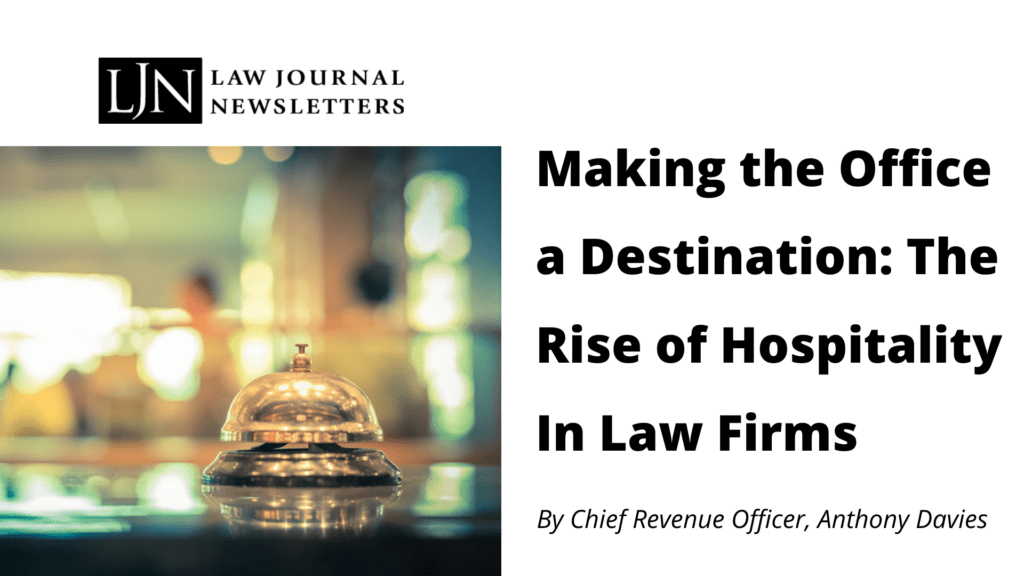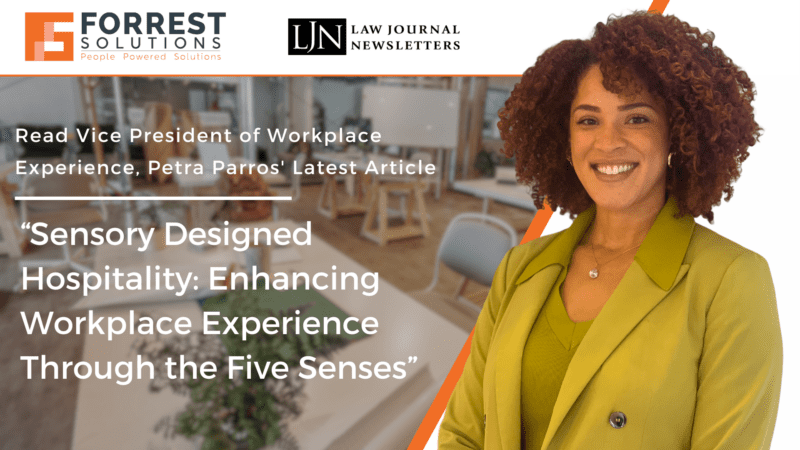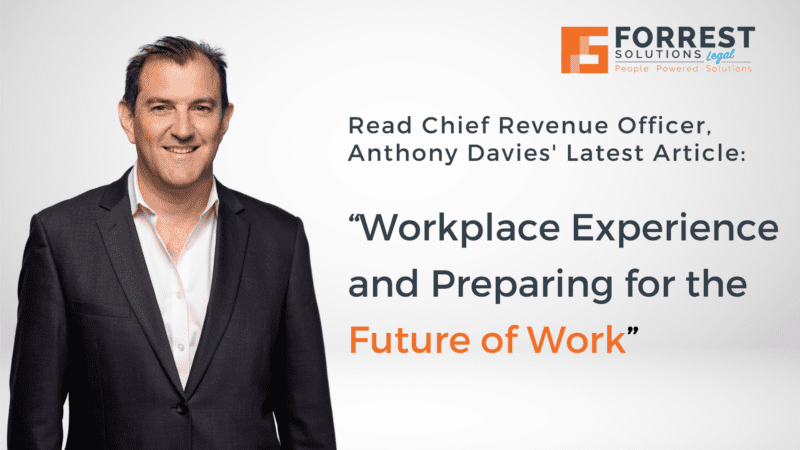
This article originally appeared in Law Journal Newsletters here
We are in the midst of a global paradigm shift. The meaning of the “office” has forever changed because minds have changed. For law firms, the office was historically the place where lawyers performed work. The pandemic changed that — first by physically changing it, then by creating a change of mind about work.
Because of this change of mind, lawyers and professionals — as part of negotiating the returning to the office — are busy deconstructing “work” into its many smaller components in an effort to redefine where these activities ought to take place. Some of these components, it is argued, are better suited for the solo office at home and some are better suited for the social setting of the office.
The law firm office cannot remain unchanged, therefore, as if frozen in time set to some date prior to the onset of pandemic, when the terms and meaning have all changed.
In fact, the office must now provide benefits or an experience the lawyers and staff cannot get at home. Working from home has made the barrier between work/home permeable; in a similar sense, the office now provides some comforts of home, but better. Just like the home office provides a more comfortable setting, the headquarter office must provide comfort benefits that are better — and from Perkins Coie, to BakerHostetler, to Katten Muchin, many are announcing these new perks and amenities to entice lawyers back to the office, that make the office in a work sense “better” than home.
Some firms are even taking their amenities and benefits to another level by adding a layer of 5-star hospitality services: literally creating concierge roles and staffing them with people who have background experience working in 5-star hotels like the Ritz Carlton or Mandarin Oriental. Making the office better than home — making it a destination —is the key shift law firms are experiencing right now. We are calling it all ‘the rise of hospitality’ — and there’s precedent.
5-Star Hospitality: Precedent from Other Verticals
In other industries, 5-star hospitality has been long integrated in their brands. These global brands are creating immersive, authentic connections that support meaningful memorable moments in an effort to drive loyal behavior. This is one of the pillars of Ritz Carlton’s world-renowned service.
In commercial real estate, for instance, the Durst Organization recently launched a new amenity brand for its residential and commercial properties by launching Well& By Durst, a wellness initiative that includes an artisanal food hall curated by Master Chef Charlie Palmer, taking onsite culinary offerings to another level. Other global real estate companies ensure a seamless experience of the company brand with white glove services that provide high level of attention, including tailored coffee and water choices, room escorting versus pointing, walking guests with umbrellas in inclement weather, restaurant recommendations and reservations, room temperature adjustments upon request and more.
Executive Briefing Centers (EBCs) across technology and manufacturing brands are being transformed into Customer Experience Centers (CECs). EBCs were traditional, one-dimensional spaces designed to support one-way communication approaches to sales where organizations presented, usually in PowerPoint, the latest tool, product or innovation. This is no longer sufficient. CECs immerse customers in multi-dimensional experiences layered with luxurious services that connect customers to the brand in unique and unforgettable ways.
In professional services, including Big 4 consultancies, brands have long ago opted to blend home-life/work-life, work-life/home-life by providing up to 100% flexible work policies — and then making the office a destination with the likes of Xbox, yoga and “chill out” rooms, treadmill desks, upscale bars and restaurants and dedicated concierge services on every floor.
Dedicated concierge services ensure each client, guest and partner is directly serviced with a single point of contact — a one-stop shop — who can deliver all services expected, make all comfort adjustments, provide escorting and anticipate and fulfill unexpected needs.
The Rise of Hospitality In Law Firms
For law firms, there are two very persuasive reasons to add this type of 5-star hospitality to their list of benefits: talent wars and real estate.
Everyone knows by now that this is the most heated war for talent on record. The most recent data from Thomson Reuters published at the COO CFO Forum in NYC showed the top two risks firms are reporting are: 1) lawyer recruitment and retention; and 2) poaching by competitors. The Q3 PMI data supported this as well, showing that turnover jumped from 10.9% in Q2 to 13.8% in Q3.
Lawyers are unmoored from brand loyalty, looking for the bigger better deal, and it’s not monetary: it’s the right mix of where and how they work. 5-star hospitality is a proven effective method for an organization to create loyalty by creating an experience that cannot be had elsewhere.
In regards to real estate, the market is experiencing a bifurcated approach to either reduce their office real estate footprints or increase it. When reduction strategies are at play, these are correlated with an increase of hoteling, which the majority of firms (75+%) plan to leverage. The smart firm will also add a layer of 5-star hospitality here, to ensure the great experience of lawyers in their new workflows.
This is line with the practices of companies in other verticals where hoteling and 100% work flexibility have been successfully in place for some time. In professional services, including PwC, Deloitte, KPMG and others, “clean desk” policies have long supplanted desk “ownership” and “private” office spaces. Technologies and support staff support hoteling in professional services such as wayfinding, meeting room and desk booking platforms, virtual reception and brand ambassadors have been embraced to create seamless experiences for staff and visitors alike.
Based on utilization studies from UnWork — prior to the pandemic — the highest in-office desk utilization was 72%. This, in combination with a hybrid work force, could result in more than 40% of office space being unoccupied at any given time. Emptiness is a very large motivator for firms to act on the second largest overhead cost at any law firm — real estate.
But emptiness impacts another aspect of the firm: culture. What is the cultural impact of ‘emptiness’? Emptiness is not an enticing factor to bring lawyers and professionals back into the office; emptiness is not what makes the office better than home. A new process must be put in place.
When increasing, most firms are adding amenities spaces, not offices. Real estate costs are also at an all-time low — so this strategy makes sense as well and organizations are bargain hunting. According to the CBRE Group, companies leased roughly 5.9 million square feet in Manhattan during the third quarter of this year, and there was a 70% jump in the second quarter of commercial leasing in Manhattan.
Lowenstein Sandler, for example, added 25,000 square feet to its previously 100,000-square-foot footprint in its Midtown Manhattan office, reporting that securing extra space now with rents cheaper than they were pre-pandemic saved money for the growing firm — and transforming the office into a destination for attorneys and staff.
Conclusion: The Office May Change But the Brand Does Not
The meaning of work and the office have changed, but one thing that has not changed is the meaning and value of a law firm’s brand. 5-star hospitality services transform the office into something new, a destination, an experience, a brand experience — and it applies across all cases, to both expansion and reduction strategies. We like to call it “the rise of hospitality” because it is more than a service offering. Hospitality is a feeling that changes you — and the feeling is loyalty.





